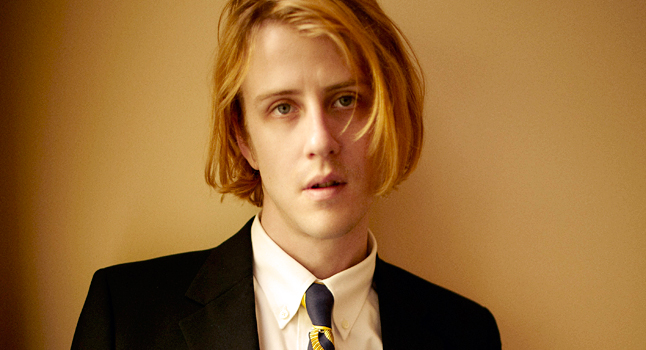Videos by American Songwriter
When Christopher Owens disbanded Girls in July 2012, it was a fast, clean breakup. No rumors were spread. No public fights were had. Within months, Owens had announced a new project — a concept album based on his first Girls tour in 2008 — and started recording the new material with producer Doug Boehm.
Released last month, Lysandre doubles as Owens’ first solo album. The title refers to a woman he met on the road, and many of the songs — especially during the album’s second half — are about the pair’s relationship. Lysandre isn’t just a love story, though. It’s a road journal, a memoir, a first-hand account of what happens when your band travels the globe for the very first time.
We talked with Owens about Lysandre the girl, Lysandre the album, and the process of turning the former into the latter.
Your new album is named after a girl, but Lysandre also feels like a sendoff to your former band. Did you write the album with that duality in mind?
No, this album was written just a few months after the tour the album is about, and that tour — love affair included — was the only thing on my mind when I was writing it. It is interesting for me to see the way it ends up applying to other things in my life now… and just life in general. I guess that may be why songs are such wonderful things: the adaptation.
Often, a song is able to express something that words cannot. On Girls’ “Honey Bunny,” for example, you confessed some personal feelings toward your mother, knowing that she’d eventually hear the song and take your lyrics to heart. Are there moments on Lysandre where you confess similar things to other people? Here’s another way of asking the same question: do these songs rehash conversations that you’ve already had, or do they say things that you’ve always wanted to say in person, but were never able to do so?
I think they say the things that I learn when I’m reflecting, or that can be learned in retrospect. For me, they often comment on times when there was really no chance to make a comment… almost like a second chance to express feelings that can be suppressed in the moment. I think we’ve all had times where we know what we’d say to someone or about something after the original opportunity to do so has passed, and we wish we could go back and say that right thing. Songs give me that opportunity sometimes.
What’s the story behind the saxophone solo in “New York City?” That sax is nuts! Was your intention to capture the exuberance and craziness of a night in New York?
It was about the sound, for me. That song is about rock and roll — and New York — and the sax is a sound that I associate with New York rock and roll… I think maybe because of Lou Reed. I worked with everyone one-on-one in the studio, I had recorded most of the songs, and then had Vince [Meghrouni] come in and listen and talked to him about the type of solo I wanted to hear. He was a friend of a friend… so I was just getting to know him then. Luckily for me, he understood the sound I wanted to hear, and he nailed it right away. I love it, too; it was a lot of fun recording that song.
Many of these songs sound like the locations that inspired them. “New York City” sounds like New York. “Riviera Rock” sounds like the French Riviera. As a songwriter, what tricks did you employ to make sure the tone of the music conveyed the tone of the lyrics?
I thought of other music from those places, just a sort of free association of sound. I tried to keep it obvious and simple. I wanted something that wouldn’t have to be questioned. The album—lyrically—is about a tour, and I wanted the music to help the story to travel. To take the listener away on the journey the record is about.








Leave a Reply
Only members can comment. Become a member. Already a member? Log in.